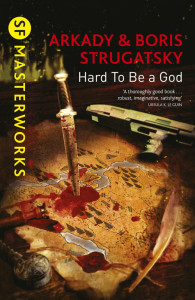Gollancz, RRP $22.99
June 2015
 Olena Bormaschenko’s translation of Arkady and Boris Strugatsky’s Hard to Be a God represents the second translation of the Russian sci-fi classic into English. As much is discussed in the forward to the book, by Ken MacLeod, who admits to an abortive first attempt to read the novel back in 1977. Admittedly not a reader of much sci-fi myself*, I had never heard of Hard to Be a God before receiving it for review. I am certainly glad for the new translation, if MacLeod’s criticisms are accurate. Bormaschenko’s edition is a clear and easily readable one. Indeed, in terms of translation my only quibble is with the use of rather twee insults and phrases at times. However, since the book was written in the 1960s, this is likely an accurate reflection of how it reads in Russian.
Olena Bormaschenko’s translation of Arkady and Boris Strugatsky’s Hard to Be a God represents the second translation of the Russian sci-fi classic into English. As much is discussed in the forward to the book, by Ken MacLeod, who admits to an abortive first attempt to read the novel back in 1977. Admittedly not a reader of much sci-fi myself*, I had never heard of Hard to Be a God before receiving it for review. I am certainly glad for the new translation, if MacLeod’s criticisms are accurate. Bormaschenko’s edition is a clear and easily readable one. Indeed, in terms of translation my only quibble is with the use of rather twee insults and phrases at times. However, since the book was written in the 1960s, this is likely an accurate reflection of how it reads in Russian.
Hard to Be a God is the rather Star Trekish tale of a future earth man living undercover as an observer on a planet and in a feudal kingdom. Because of the similarities of this planet’s feudal culture to Earth’s European middle ages, Anton and several other historians are there to note social development and… stuff. Unfortunately, what Anton sees unfolding does not follow the progression his historical studies have prepared him for. Instead, he finds the unmistakeable signs of fascism emerging.
Anton is faced with a dilemna. Should he act and try and prevent the rise of fascism in his host kingdom? Or should be remain an observor, knowing what havoc and bloodshed will result. Also of consideration is his beloved Kira, a sweet and pure innocent, in whom he confides his true origins and cares.
Given the book was written in the 1960s, I have tried to be forgiving of several aspects I would find frustrating, even unforgiveable, in more recently published works. I disagree with the theory of history that is central to the plot, one based on a Marxist progression from feudalism and into socialism via capitalism, but of course the Strugatsky brothers were writing in the USSR in a time when this was the dominant theory of history. I also find frustrating the assumption that people living in a less technological or educated society are necessarily more ignorant, passive or dull than we are. Increased nutrition and education have improved human intelligence, but our ancestors were not idiots. They had the same capacity for passion and inventiveness as anyone alive today, even if different economic and social pressures meant they could not fulfil them to the same extent.
The sexism of the book is also an annoyance. Again, I tried to read through it because of the book’s age. Of the book’s three named female characters, one is an Earth friend of Anton’s who barely appears; the second, after one scene, is called a whore by Anton after she propositions him, and shortly thereafter dies offscreen; the third is Kira. Kira is a pure, wholesome and utterly bland character who serves mainly as something for Anton to protect; an attachment to his host world. She is also a sounding board for his aspirations. Her eventual fate should come as a surprise to no one, though the trope may not have been quite so staid back in 1964.
Despite these issues though, Hard to Be a God is a genuinely interesting read, pacy and entertaining. Arkanar is a kingdom of high drama and adventure, and Anton’s philosophical musings and conversations about the nature of power and humanity form a nice contrast to the action. It is a quick and diverting read which will be of interest to fans of Star Trek, especially the Original Series, and other classic mid-century sci-fi.
*You might wonder what, then, I do actually read, since a fair few of my recent reviews have included this disclaimer. The answer is a little bit of most things, though I am a fussy reader. Is this something at all well-suited to the task of book reviewing? We shall find out together.

